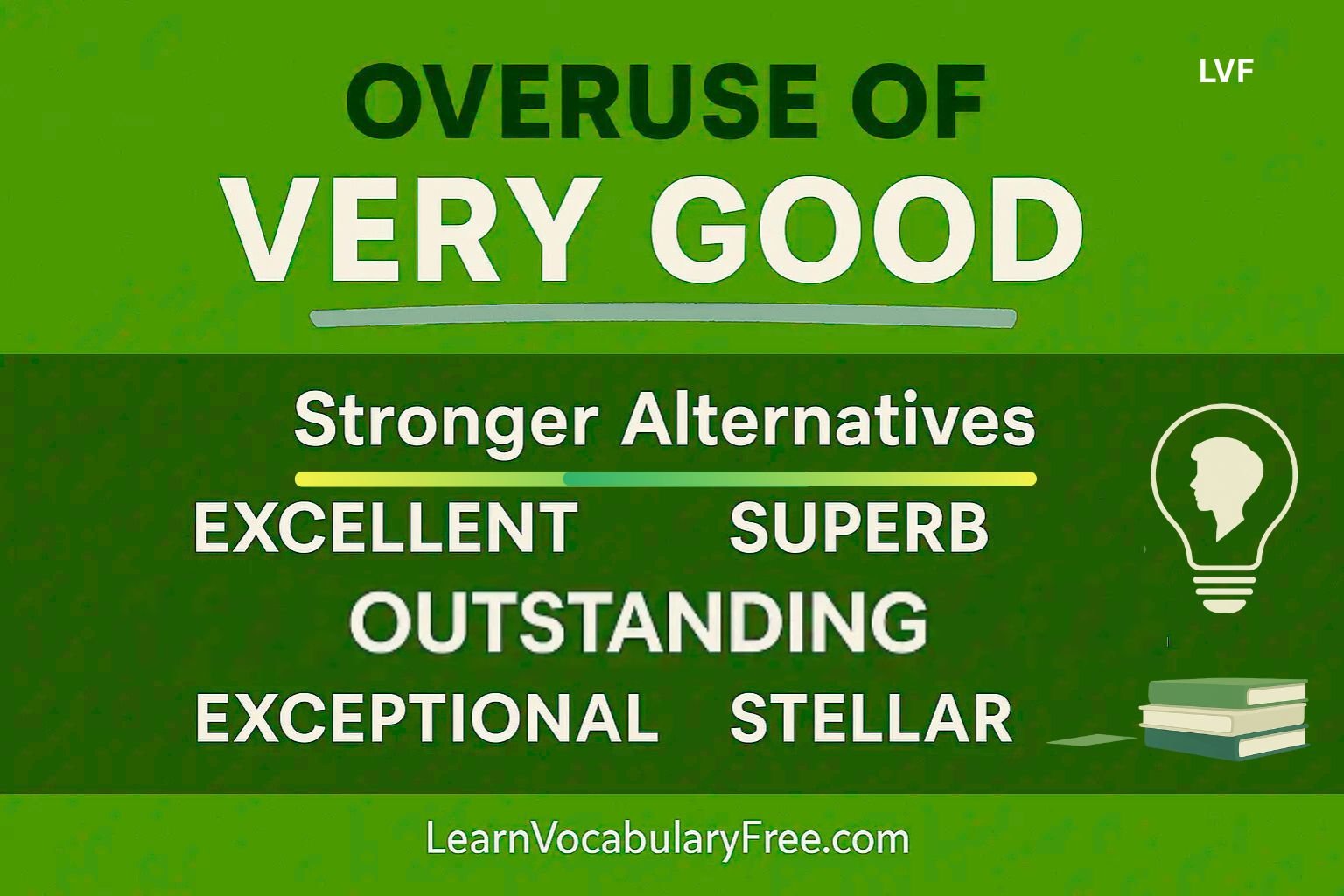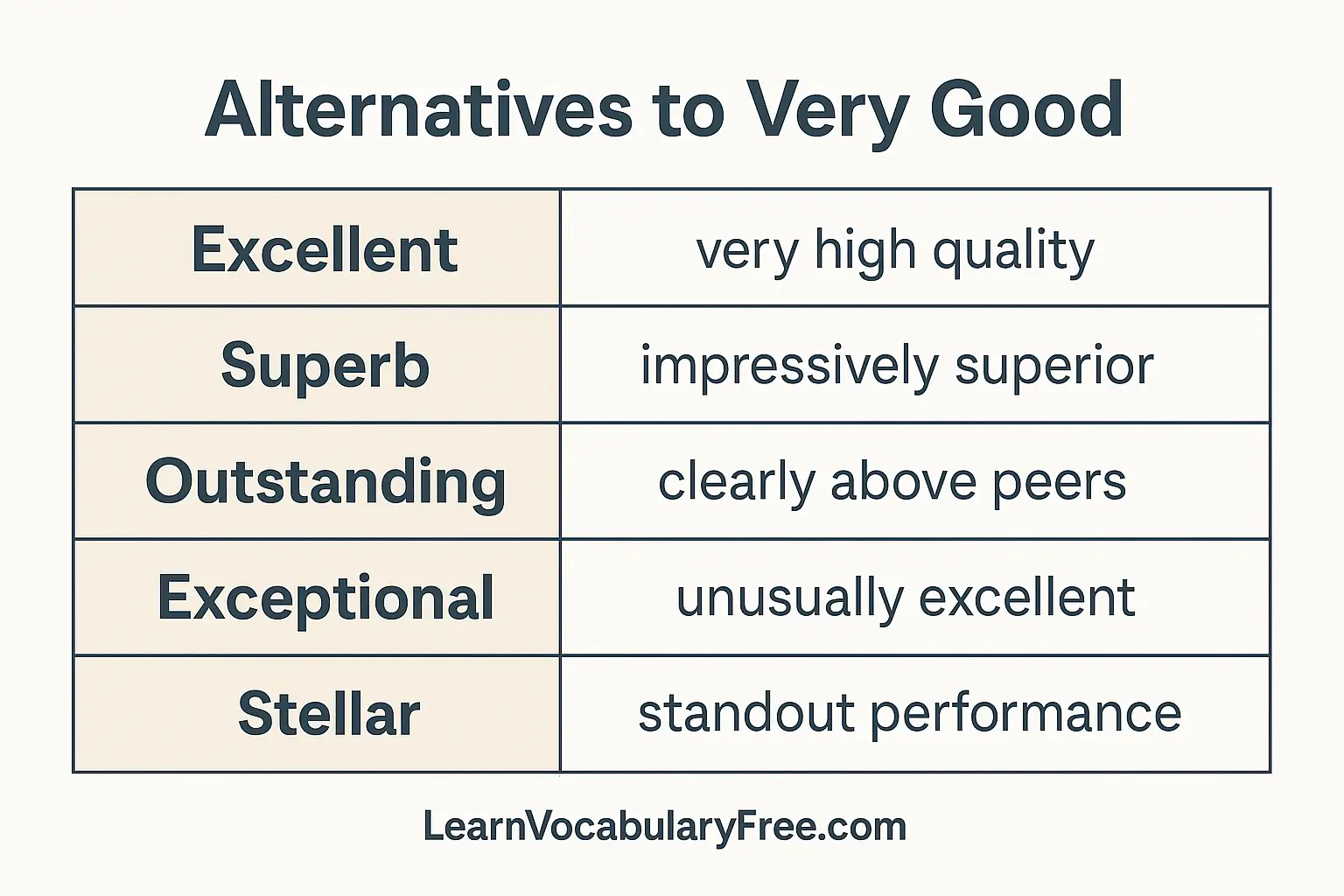Overuse of Very Good: 5 Powerful Alternatives to Upgrade Your Vocabulary
If the Overuse of Very Good keeps slipping into your writing, you’re not alone. Here’s how to replace it with precise, powerful language.

Why the Overuse of Very Good Hurts Your Expression
Relying on very good makes your language sound generic. Readers can’t tell if something is barely above average or truly exceptional. That lack of precision reduces clarity, impact, and credibility.
What “Very Good” Fails to Do (and When to Avoid Overused Words)
It Loses Nuance
“Very good” could mean solid, impressive, or near-excellent—but which? Overused phrases hide your true evaluation.
It Causes Reader Fatigue
Repetition dulls attention. Specific, varied adjectives keep readers engaged and help ideas land.
It Underserves Professional & Test Contexts
In reports, emails, and essays (SAT/IELTS/TOEFL), precise vocabulary signals control and clarity—traits “very good” rarely conveys.
Why We Default to the Overuse of Very Good
Habit and the “Safe Choice”
We reach for familiar words under time pressure. That’s normal—but fixable.
Limited Ready-to-Use Alternatives
Without a small bank of stronger words, we fall back on “very good.”
Early Reinforcement
“Very good” is praised from childhood—so it persists into adult writing.
5 Powerful Alternatives to Very Good (With Usage Notes)
Excellent — high quality
- Use when evidence clearly supports top performance.
- Formal-friendly; safe in reports and recommendations.
Example: “Her proposal is excellent—clear, concise, and well-researched.”
Superb — impressively superior
- Stronger emphasis than “excellent,” slightly more expressive.
- Great for presentations, reviews, and public praise.
Example: “That was a superb client presentation.”
Outstanding — conspicuously great
- Highlights clear distinction above peers or expectations.
- Use with metrics or outcomes when possible.
Example: “The team delivered outstanding results this quarter.”
Exceptional — unusually excellent
- Signals rarity; use sparingly to keep its power.
- Ideal for awards, testimonials, and performance reviews.
Example: “Her analysis was exceptional in depth and accuracy.”
Stellar — standout performance
- Modern tone; energetic but professional.
- Good fit for presentations and executive summaries.
Example: “He gave a stellar demo to stakeholders.”

How to Choose the Best Alternative (Improve Vocabulary Expression)
Match the Strength
Is it clearly strong or truly elite? Pick the adjective that reflects that intensity.
Consider Tone and Audience
“Stellar” is energetic; “exceptional” is formal; “superb” is emphatic. Align with context.
Lead with Evidence
Whenever possible, support your praise with data, outcomes, or examples.
Avoid Overused Words in Writing: Break the Habit in 7 Days
- Track every “very good” you write.
- Replace each instance with one stronger alternative.
- Build a five-word “better than very good” bank.
- Review emails before sending—swap vague phrases.
- Revise a past paragraph purely for precision.
- Collect examples from high-quality sources.
- Repeat weekly; keep what feels natural.
Helpful Resources (Internal & External)
📘 SAT High-Frequency Words (LVF Word Lists)
372 essentials with definitions and practice — build precise alternatives fast.
🧠 LVF Vocabulary Quizzes: Stronger Words than “Very Good”
Test excellent, superb, outstanding, exceptional, and stellar — and strengthen your vocabulary.
📖 Definition of “Good” by Cambridge Dictionary
See meanings, pronunciation, and usage examples to choose the right word and tone.
🔎 Thesaurus for “Good” by Merriam-Webster
Explore synonyms like excellent, superb, outstanding with nuance and contextual guidance.
Conclusion: Retire the Overuse of Very Good and Be Precise
Precision beats repetition. Swap “very good” for targeted adjectives and your writing becomes clearer, more persuasive, and more professional.
Try it now: revise one paragraph and replace every “very good” with a stronger, context-true alternative.
